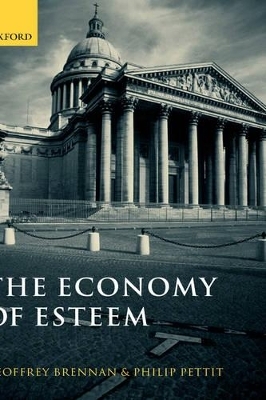
The Economy of Esteem
Oxford University Press (Verlag)
978-0-19-924648-9 (ISBN)
However much people want esteem, it is an untradable commodity: there is no way that I can buy the good opinion of another or sell to others my good opinion of them. But though it is a non-tradable good, esteem is allocated in society according to systematic determinants; people's performance, publicity, and presentation relative to others will help to fix how much esteem they enjoy and how much disesteem they avoid. The fact that it is subject to such determinants means in turn that rational individuals are bound to compete with one another, however tacitly, in the attempt to control those influences, increasing their chances of winning esteem and avoiding disesteem. And the fact that they all compete for esteem in this way shapes the environment in which they each pursue the good, setting relevant comparators and benchmarks, and determining the cost that a person must bear -- the price that they must pay -- for obtaining a given level of esteem in any domain of activity.
Hidden in the multifarious interactions and exchanges of social life, then, there is a quiet force at work -- a force as silent and powerful as gravity -- which moulds the basic form of people's relationships and associations. This force was more or less routinely invoked in the writings of classical theorists like Aristotle and Plato, Locke and Montesquieu, Mandeville and Hume and Madison. Sometimes it was invoked to explain why people behaved as they did, sometimes to identify initiatives whereby they might be persuaded to behave better. Although Adam Smith himself gave it great credence, however, the rise of economics proper coincided with a sudden decline in the attention devoted to the economy of esteem. What had been a topic of compelling interest for earlier authors fell into relative neglect throughout the nineteenth and twentieth centuries.
This book is designed to reverse the trend. It begins by outlining the psychology of esteem and the way the working of that psychology can give rise to an economy. It then shows how a variety of social patterns that are otherwise anomalous come to make a lot of sense within an economics of esteem. And it looks, finally, at the ways in which the economy of esteem may be reshaped so as to make for an improvement -- by reference to received criteria - in overall social outcomes. While making connections with older patterns of social theorising, it offers a novel orientation for contemporary thought about how society works and how it may be made to work. It puts the economy of esteem firmly on the agenda of economic and social science and of moral and political theory.
Philip Pettit was born (1945) and trained in Ireland, first at the National University (Maynooth College), where he took a BA. and M.A, and later at Queen's University, Belfast, where he took his Ph.D. He taught in University College, Dublin (1968-72, 1975-77) before holding a Research Fellowship at Trinity Hall, Cambridge (1972-75) and then, in 1977, taking the Chair of Philosophy at Bradford University. He moved to the Australian National University in 1983, where he was Professor of Social and Political Theory until 2002, when he moved to Princeton University. He taught at Columbia University as a regular Visiting Professor of Philosophy from 1997 to 2001. He teaches political theory and philosophy at Princeton, where he is William Nelson Cromwell Professor of Politics. Geoffrey Brennan trained originally as a public economist, but increasingly works in rational actor political theory. He was for ten years in the department of Public Finance at ANU, before he went to a Professorship in the Public Choice Center at Virginia Tech where he worked with Nobel Laureate James Buchanan. In 1983, he returned to the ANU to be head of the Economics Department and in 1991 became Director of the Research School of Social Sciences, a position which he held until 1997. He is currently Editor of the journal Economics and Philosophy, and President of the Public Choice Society. He currently holds a Chair in the RSSS in the Social and Political Theory Program.
Introduction. Rediscovering the Economy of Esteem ; PART I. TOWARDS AN ECONOMICS OF ESTEEM ; 1. The Nature and Attraction of Esteem ; 2. The Demand for Esteem ; 3. The Supply of Esteem ; 4. The Economy of Esteem ; PART II. WITHIN THE ECONOMICS OF ESTEEM ; 5. A Simple Equilibrium in Performance ; 6. A More Complex Equilibrium in Performance ; 7. Multiple Equilibria and Bootstrapping Performance ; 8. Publicity and Individual Responses ; 9. Publicity and Accepted Standards ; 10. Seeking and Shunning Publicity ; 11. Voluntary Association ; 12. Involuntary Association ; PART III. EXPLOITING THE ECONOMICS OF ESTEEM ; 13. The Intangible Hand in Profile ; 14. The Intangible Hand in Practice ; 15. Mobilising the Intangible Hand
| Erscheint lt. Verlag | 18.3.2004 |
|---|---|
| Zusatzinfo | numerous figures |
| Verlagsort | Oxford |
| Sprache | englisch |
| Maße | 162 x 242 mm |
| Gewicht | 672 g |
| Themenwelt | Geisteswissenschaften ► Psychologie ► Verhaltenstherapie |
| Wirtschaft ► Allgemeines / Lexika | |
| Wirtschaft ► Volkswirtschaftslehre | |
| ISBN-10 | 0-19-924648-3 / 0199246483 |
| ISBN-13 | 978-0-19-924648-9 / 9780199246489 |
| Zustand | Neuware |
| Informationen gemäß Produktsicherheitsverordnung (GPSR) | |
| Haben Sie eine Frage zum Produkt? |
aus dem Bereich


